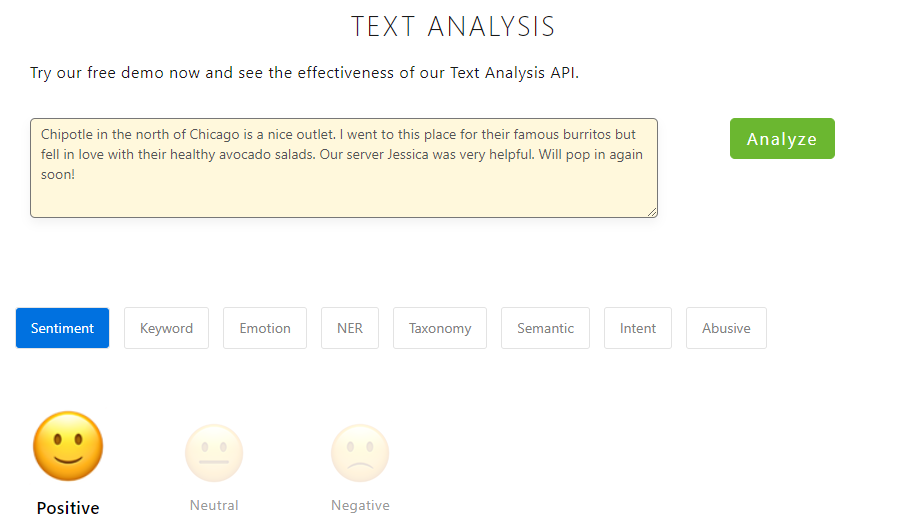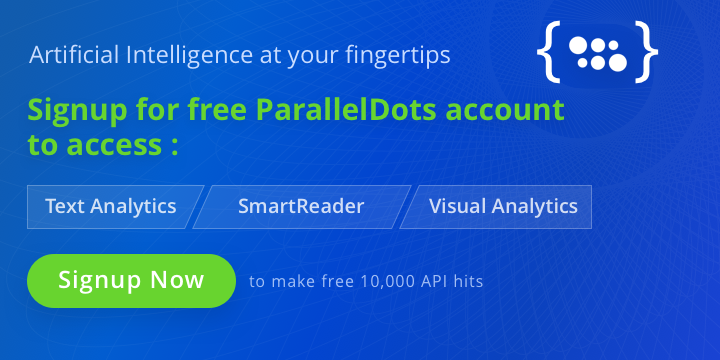Text Analysis APIs are a tool used for determining high-end conclusions and actionable insights derived from a set of data through built up examples and patterns in it. It is usually done using techniques such as statistical pattern learning. The entire process of text mining can be majorly classified into three steps:
- Organizing the input data
- Deriving patterns from the organized data
- Assessing and interpreting conclusions from those patterns
In this article, we’ll talk about the need for text analysis APIs and the various ways in which a business can analyze their data for deriving meaningful information.
The need for Text Analysis APIs
By now, you must be wondering why would a business need text analysis APIs in the very first place. Let me answer this question by telling you a short story.
A long time ago (no, I am not talking about the Medieval Age), there was a boy named Harry. He had an excellent idea in mind, which he soon converted to a budding startup. He built his team and developed a product, which began to reach his target audience quickly. This further motivated him to expand the idea. Everything seems fine until now, doesn’t it? Well, that’s where the real twist comes in.
There was something that was bothering Harry a lot. He knew his product was reaching the right audience, but he couldn’t figure out if they were satisfied with the concept and working of his idea. Moreover, he had no clue how to expand his startup to serve his clients in a better way. That’s when an idea struck his mind. He thought of conducting a survey among his customers to know their reaction to the product, the problems they face, the suggestions they have, etc.
So, the survey was conducted, and the response was beyond imagination. The company received inputs in large numbers, so much so that it became a challenge to analyze such a huge amount of data. Moreover, there was a lot of data available online in the form of brand mentions on social platforms which was to be analyzed too. And all of this information was very open-ended. So, deriving insights as per the company’s requirements was a matter of concern. Doing the analysis manually was something very close to impossible because apart from these problems, there was a high risk of missing out on important information, something they couldn’t afford at the present stage.
This is a situation a lot of businesses face, and that is when text analysis comes into the picture. It uses various Artificial Intelligence and Machine Learning techniques to extract hidden information from a piece of text. This reduces the time required for the process to complete and makes it easier, effective, and efficient.
ParallelDots offers a variety of AI APIs for online text analysis. But what makes it stand apart? Well, they utilize the latest techniques of Deep Learning like LSTMs, Transfer Learning, etc., so that their Text Analysis APIs perform much better than traditional Natural Language Processing methods. These APIs can be combined with a business to solve complex problems such as building chatbots, social media analytics, process automation, etc. Besides this, the data is highly secure, as GDPR and HIPAA compliances are followed very seriously. For sectors such as the healthcare industry, where data is too sensitive to be uploaded on a foreign server, ParallelDots offers on-premise deployment services, which further enhances security because the data never leaves the client’s server. These APIs work efficiently even on tricky sentences and return results in an extremely short time.
Types of AI APIs
Let us now talk about the various types of text analysis APIs offered by ParallelDots that can be used to analyze data in different ways:
- Sentiment Analysis:
Sentiment Analysis API examines an incoming message and tells whether the basic notion behind it is positive, negative, or neutral. The tool provides accurate analysis and can be widely applied to reviews and social media for a variety of applications, such as market research, tracking company/product reviews, studying public opinion, etc. It also helps in comprehending the social notion of a brand, product or service while observing the online discussions. - Emotion Analysis:
Sometimes, to draw certain conclusions, the three classes of sentiment (positive, negative and neutral) are not adequate. This is where emotion analysis comes into the picture. This API points out the subtle differences in the meaning of the sentence, i.e. whether the person saying it is Happy, Sad, Angry, Fearful, Excited, Bored or anything else. Hence, it gives a deeper analysis. Emotion analysis helps marketers and client support to read and examine emotions and precisely distinguish the feeling of any information. - Keyword Extractor:
Keyword Extractor API generates a list of relevant keywords and phrases in a piece of text and ranks them. This makes it useful in applications such as data indexing, generating tag clouds, and speeding up the search time. The keyword extraction algorithm works on statistical analysis. It generates a relevance score for each keyword which is used to sort the final result. Keyword extraction from text is helpful for say, digital marketers as it makes the keyword research process easier and understandable. - Named Entity Recognition:
The main function of named entity recognition tool is to find and group the entities(elements) of any text into defined categories, such as the name of the person, organizations, locations, cities, etc. This API can work on any type of content, be it a web page, news item, or social media. - Text Classification:
Businesses collect a lot of data on client behavior from social networks. The Text Classification API assigns one or more categories to this text, which helps to structure it and give a deeper understanding for better analysis. This, in turn, makes search and navigation easier, something that is highly useful for newspapers or online business portals. The text classification tool also comes in handy when working with large datasets. - Semantic Analysis:
Semantic analysis API groups articles on the basis of their similarity, i.e., it compares the content of different articles and checks their relatedness. Semantic analysis is considered very useful in areas such as research, as it removes content that is no longer useful. It also helps bloggers, publishing and media houses to create better content by recovering articles similar to their topic of interest from the past. For news aggregators, the API can group similar news from various platforms, so as to clean the user feed.
You can check out more such AI APIs here. ParallelDots even offers custom solutions in case an organization’s needs are not met by one of these APIs.
Conclusion
If a business relies only on basic sentiment analysis and count-based metrics, there are high chances that it may miss out on important conclusions from their data. The latest advances in technology can help an organization to get better insights from social media and surveys. Companies have started to realize the power of AI, deep learning and intelligent classifiers and are using it extensively to get the deepest of the information. Karna, a sister organization of ParallelDots, is another platform to generate meaningful insights from digital media.
We hope you liked the article. Please Sign Up for a free ParallelDots account to start your AI journey.

